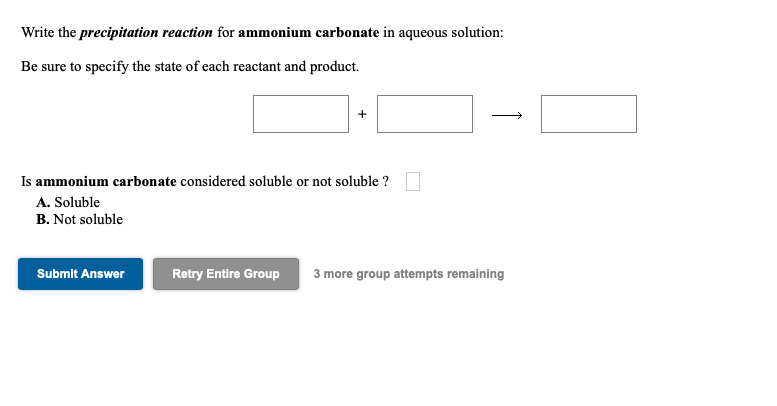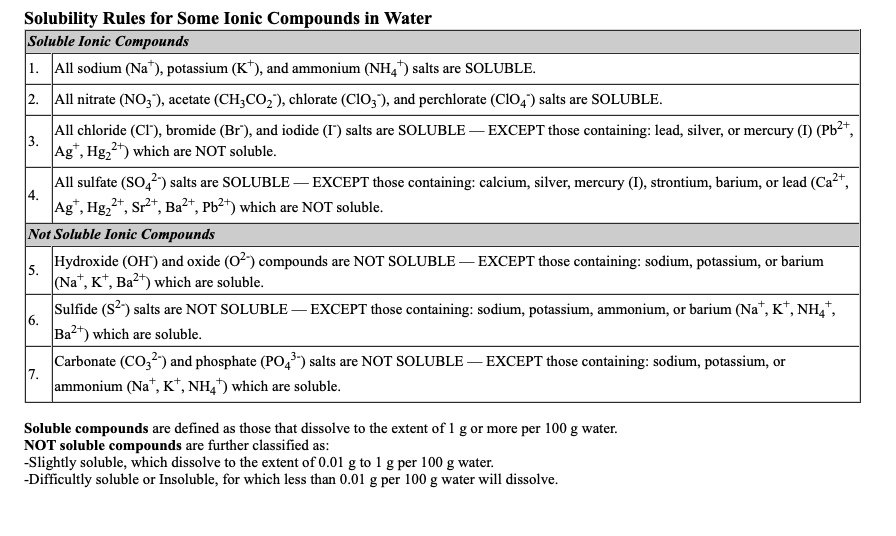Write the precipitation reaction for ammonium carbonate in aqueous solution: Be sure to specify the state of each reactant and product. Is ammonium carbonate considered soluble or not soluble ? A. Soluble B. Not soluble
Write the precipitation reaction for ammonium carbonate in aqueous solution: Be sure to specify the state of each reactant and product. Is ammonium carbonate considered soluble or not soluble ? A. Soluble B. Not soluble
General Chemistry - Standalone book (MindTap Course List)
11th Edition
ISBN:9781305580343
Author:Steven D. Gammon, Ebbing, Darrell Ebbing, Steven D., Darrell; Gammon, Darrell Ebbing; Steven D. Gammon, Darrell D.; Gammon, Ebbing; Steven D. Gammon; Darrell
Publisher:Steven D. Gammon, Ebbing, Darrell Ebbing, Steven D., Darrell; Gammon, Darrell Ebbing; Steven D. Gammon, Darrell D.; Gammon, Ebbing; Steven D. Gammon; Darrell
Chapter17: Solubility And Complex-ion Equilibria
Section: Chapter Questions
Problem 17.15QP: Solubility and Solubility Product You put 0.10-mol samples of KNO3, (NH4)2S, K2S, MnS, AgCl, and...
Related questions
Question

Transcribed Image Text:Write the precipitation reaction for ammonium carbonate in aqueous solution:
Be sure to specify the state of each reactant and product.
+
>
Is ammonium carbonate considered soluble or not soluble ?
A. Soluble
B. Not soluble
Submit Answer
Retry Entire Group
3 more group attempts remaining

Transcribed Image Text:Solubility Rules for Some Ionic Compounds in Water
Soluble Ionic Compounds
|1. All sodium (Na"), potassium (K*), and ammonium (NH,) salts are SOLUBLE.
2. All nitrate (NO3), acetate (CH3CO,), chlorate (CIO; ), and perchlorate (CIO4) salts are SOLUBLE.
All chloride (CI"), bromide (Br"), and iodide (I') salts are SOLUBLE – EXCEPT those containing: lead, silver, or mercury (I) (Pb2*,
3.
Ag", Hg,2") which are NOT soluble.
All sulfate (SO,2) salts are SOLUBLE – EXCEPT those containing: calcium, silver, mercury (I), strontium, barium, or lead (Ca2",
4.
Ag", Hg,2*, Sr*, Ba2", Pb²") which are NOT soluble.
Not Soluble Ionic Compounds
Hydroxide (OH") and oxide (O?) compounds are NOT SOLUBLE – EXCEPT those containing: sodium, potassium, or barium
5.
(Na", K*, Ba2") which are soluble.
Sulfide (S2) salts are NOT SOLUBLE – EXCEPT those containing: sodium, potassium, ammonium, or barium (Na", K*, NH4*,
6.
Ba2") which are soluble.
Carbonate (CO,2) and phosphate (PO,') salts are NOT SOLUBLE – EXCEPT those containing: sodium, potassium, or
7.
ammonium (Na", K*, NH,*) which are soluble.
Soluble compounds are defined as those that dissolve to the extent of 1 g or more per 100 g water.
NOT soluble compounds are further classified as:
-Slightly soluble, which dissolve to the extent of 0.01 g to 1 g per 100 g water.
-Difficultly soluble or Insoluble, for which less than 0.01 g per 100 g water will dissolve.
Expert Solution
This question has been solved!
Explore an expertly crafted, step-by-step solution for a thorough understanding of key concepts.
This is a popular solution!
Trending now
This is a popular solution!
Step by step
Solved in 2 steps

Knowledge Booster
Learn more about
Need a deep-dive on the concept behind this application? Look no further. Learn more about this topic, chemistry and related others by exploring similar questions and additional content below.Recommended textbooks for you

General Chemistry - Standalone book (MindTap Cour…
Chemistry
ISBN:
9781305580343
Author:
Steven D. Gammon, Ebbing, Darrell Ebbing, Steven D., Darrell; Gammon, Darrell Ebbing; Steven D. Gammon, Darrell D.; Gammon, Ebbing; Steven D. Gammon; Darrell
Publisher:
Cengage Learning

Introductory Chemistry: A Foundation
Chemistry
ISBN:
9781285199030
Author:
Steven S. Zumdahl, Donald J. DeCoste
Publisher:
Cengage Learning

Chemistry: Principles and Practice
Chemistry
ISBN:
9780534420123
Author:
Daniel L. Reger, Scott R. Goode, David W. Ball, Edward Mercer
Publisher:
Cengage Learning

General Chemistry - Standalone book (MindTap Cour…
Chemistry
ISBN:
9781305580343
Author:
Steven D. Gammon, Ebbing, Darrell Ebbing, Steven D., Darrell; Gammon, Darrell Ebbing; Steven D. Gammon, Darrell D.; Gammon, Ebbing; Steven D. Gammon; Darrell
Publisher:
Cengage Learning

Introductory Chemistry: A Foundation
Chemistry
ISBN:
9781285199030
Author:
Steven S. Zumdahl, Donald J. DeCoste
Publisher:
Cengage Learning

Chemistry: Principles and Practice
Chemistry
ISBN:
9780534420123
Author:
Daniel L. Reger, Scott R. Goode, David W. Ball, Edward Mercer
Publisher:
Cengage Learning

Chemistry
Chemistry
ISBN:
9781305957404
Author:
Steven S. Zumdahl, Susan A. Zumdahl, Donald J. DeCoste
Publisher:
Cengage Learning


Chemistry: An Atoms First Approach
Chemistry
ISBN:
9781305079243
Author:
Steven S. Zumdahl, Susan A. Zumdahl
Publisher:
Cengage Learning